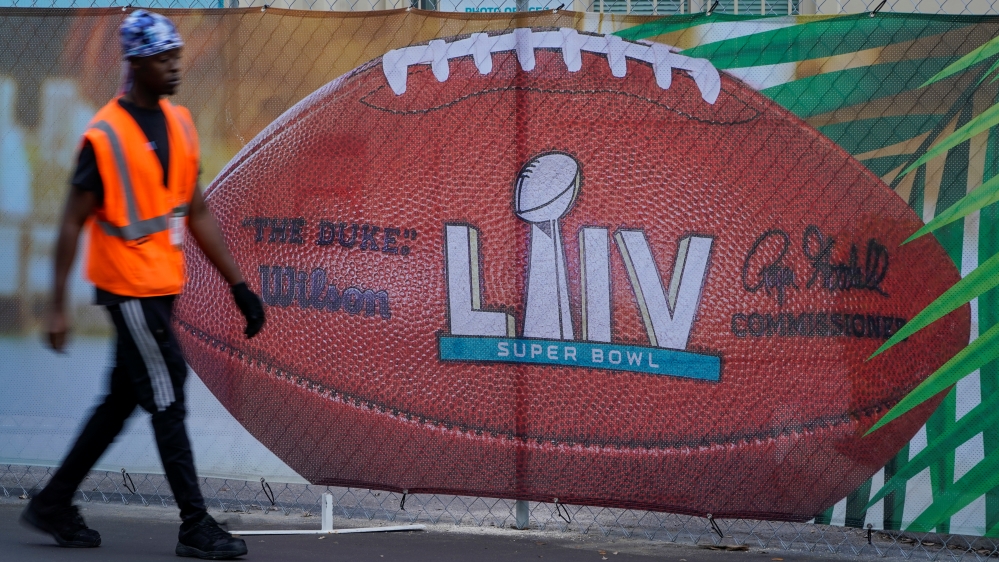Battle of the billionaires: Bloomberg & Trump duel in Super Bowl
Incumbent US president and wealthy Democratic candidate spend over $10m each on rival commercials for the Big Game.

Super Bowl games may be infamous for the audacity of the advertising that many viewers actually prefer watching over the American football championship itself.
Every year, the content and the price of commercial air time are the main subjects of conversation on Monday morning after the Big Game.
Keep reading
list of 4 itemsHow has the Taylor Swift effect boosted American football?
US football star Aaron Rodgers out for season after suffering torn Achilles
From Dearborn to the NFL: Robert Saleh’s meteoric rise
But this year, the Fox network’s broadcast of Sunday’s contest between the San Francisco 49ers and the Kansas City Chiefs is unique – not because of the sports rivalry – but due to the political nature of two prominent ad buys from United States President Donald Trump and Mike Bloomberg, a Democratic candidate running against the incumbent in 2020.
Both Trump and Bloomberg are New York City billionaires with pockets deep enough to dominate the airwaves, though to be sure the latter has about 16 times more wealth and is self-financing his campaign.
Bloomberg, the former NYC mayor who made his fortune selling financial data, has pledged to spend generously through November – even if he personally does not receive the Democratic nomination.
Trump, who has raised millions through the Republican National Committee, has already generated a war chest of more than $100m and repeatedly criticised Bloomberg’s liberal TV budget.
‘Unprecedented increase’
Bloomberg’s ad aiming to one-up the president does not mention Trump at all.
Trump has two spots, one of which is a 30-second ad running early in the game that was prereleased.
Along with other Super Bowl ads by Amazon and SodaStream, both videos were uploaded to YouTube on Thursday – with Trump’s earning considerably more views thus far.
Industry publication Ad Age reported that Fox said it is isolating the political ads so that other commercials – whether about avocados or pickup trucks – do not appear in the same game breaks. Network promos are airing alongside them instead.
Rather than the usual content about cars, soft drinks or mobile phones, the two Fox ad buys – TV’s most expensive at over $10m each – carry deeply polarising messages.
Sunday’s telecast is the first time a national political ad will be seen by the bulk of households across the US in the top annual TV event. Presidential candidates have run ads before during the Super Bowl, but only in certain states. Around 100 million viewers are expected to watch in the US alone.

“This year has seen an unprecedented increase in spending by 2020 presidential candidates on the Big Game,” said Anna Massoglia, a researcher at the Center for Responsive Politics, which tracks the effect of money on US elections.
“It’s important to note that although Bloomberg and Trump have pledged to spend substantial amounts, they are not the only presidential candidates spending on political ads,” she told Al Jazeera.
Based on political ad disclosures on file with the Federal Communications Commission as of Friday, Massoglia said that candidates are going big locally in Iowa the night before the state’s caucus.
Of the Democratic contenders, she said Bernie Sanders has spent more than $310,000 on ads slated to air around the Super Bowl, with Tom Steyer’s spending topping $270,000. Joe Biden’s campaign has dished out some $160,000, with Amy Klobuchar spending $117,000 and Elizabeth Warren spending at least $32,000.
“Although TV ad spending is technically limited to the air time available, Fox has expanded their ad offering after selling out, and some candidates have spent on digital ads around the Super Bowl, in addition to traditional political ads on TV or radio,” Massoglia said.
“In some cases, this has provided candidates like Trump and Bloomberg a chance to tease at their ads set to air during the Big Game while list building or soliciting campaign donations.”
‘No longer here’
With Shakira and Jennifer Lopez providing halftime-show entertainment, the substance of Bloomberg’s somber ad shown just afterwards is taking viewers in a different direction emotionally.
His commercial features Calandrian Kemp of Houston, Texas, narrating the tragic story of her son, George, who died in 2013 at the hands of gun violence.
“You cannot tell me that the child I gave birth to is no longer here,” Kemp says, with accompanying text indicating that 2,900 US children are killed by firearms every year – a statistic cited by Bloomberg-backed Everytown for Gun Safety.
The 60-second ad shows images of George from childhood, wearing football gear as his mother says, “I know Mike is not afraid of the gun lobby – they’re scared of him”.
Kemp adds: “When I heard Mike was stepping into the ring, I thought, ‘Now we have a dog in the fight’.”
In a campaign statement, Bloomberg said: “People will be rooting for different teams in the Super Bowl, but virtually all Americans – including people in both parties and a majority of gun owners – support universal background checks and other common-sense gun laws”.
As of early January, Bloomberg had spent by far the most of all presidential candidates on TV ads: $238m. Bloomberg has to date invested a combined $301m on ads across TV, radio and digital platforms.
And in the 2018 US midterm elections, he spent over $100m on candidates who backed stricter gun-control measures. Twenty-one out of 24 candidates he supported were victorious.
Bloomberg’s platform asks for tougher requirements for weapons permits. Beyond gun control, climate change and public health are Bloomberg’s signature issues.
Although he is not competing in the Iowa caucuses the night after the Super Bowl, Bloomberg has laser focus on the 40 percent of Democratic delegates whose votes are determined March 3 on Super Tuesday.
‘Stronger, safer, more prosperous’
Both candidates are keen on publicity during major sports spectacles. Some experts say that purchasing national ads could be more efficient than seeking an audience in every individual market. Regardless, the opposing messages are likely a preview of what is to come over the next few months.
Trump is to deliver his State of the Union address on Tuesday, and his campaign ad could pay dividends as he emerges from a lengthy impeachment saga.
While the subtext of Bloomberg’s ad is that African Americans are disproportionately impacted by gun violence, Trump’s ad highlights wage growth and the historically low unemployment rate for black and Hispanic people in 2020.
After citing US economic strength with patriotic images of military prowess, Trump also pledges that “the best is yet to come” for all Americans.
“Just as the Super Bowl crowns the greatest football team, nothing says ‘winning’ like President Donald Trump and his stellar record of accomplishment for all Americans,” Brad Parscale, the Trump 2020 campaign manager, said in a statement.
On Sunday, Fox will also show a pregame interview with Trump – who is spending the weekend at his Mar-a-Lago resort not far from the Super Bowl site in Miami.
But only the fans on their couches will judge whether the expensive game of political football is as entertaining as Budweiser and Doritos.